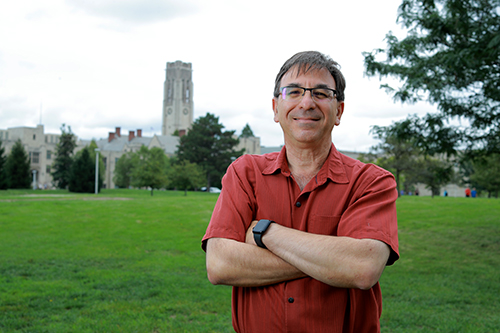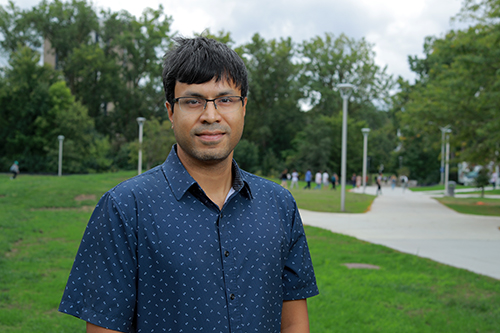Dr. Tomer Avidor-Reiss is ready to put his research to the test. Literally.
Avidor-Reiss, whose groundbreaking work on sperm centrioles has advanced scientific understanding of how life begins, is now working to develop a commercial male fertility test.

Dr. Tomer Avidor-Reiss, a professor in the UToledo Department of Biological Sciences.
In targeting a factor that’s not considered in standard semen analyses, specifically, such a diagnostic tool could shed much-needed light on the still often mysterious, often frustrating road to reproduction.
“One out of every seven couples in America is infertile, meaning that they have not been able to conceive after one year of trying. One-third of those couples who consult a doctor end up with no definitive answer as to the cause of that infertility,” said Avidor-Reiss, a professor in the UToledo Department of Biological Sciences. “That means that there are mechanisms of infertility that are not clear to us. The centriole is one of those mechanisms, and we are committed to the commercialization of our method of analyzing it.”
The work is supported by a National Science Foundation Partnerships for Innovation – Technology Translation grant valued at $250,000. It covers a two-year period that began in August.
Technology Translation grants aim to put into practice research already funded by the National Science Foundation. They’re awarded to projects with “promising commercial potential and societal impact.”
Norman Rapino, executive director of Rocket Innovations, an investment fund set up to advance student and faculty entrepreneurship, has been working with Avidor-Reiss.
“Dr. Avidor-Reiss’ research has the potential for a valuable real-world impact. Couples invest so much emotionally and financially into the process of in vitro fertilization, and sometimes it turns out that it was doomed from the start,” Rapino said. “Moving something from a lab to a real-world application is not a simple process, but I am confident Dr. Avidor-Reiss will make it happen.”
Avidor-Reiss is one of numerous researchers Rapino has steered through the National Science Foundation’s Innovation Corps, an entrepreneurial training program that prepares participants to take their ideas and technology beyond the laboratory and into the world.
The University of Toledo is an officially designated I-Corps Site.
Avidor-Reiss’ work toward a prototype test builds on years of research that culminated with the discovery of a second centriole on sperm cells, as reported in Nature Communications in 2018. That discovery upended conventional knowledge at the time, which held that sperm cells had just one of these organelles.

Dr. Aniruddha Ray, an assistant professor in the Department of Physics and Astronomy.
Avidor-Reiss has since found that this second centriole, called atypical because it is structured differently than the long-known canonical centriole, plays a role in the movement of sperm cells. He’s also found evidence to support his hypothesis that abnormalities in the formation and function of the atypical centriole contribute to infertility, subfertility and miscarriage.
That’s a particularly relevant discovery for those fertility doctors who find that contemporary fertility tests cannot account for why a couple is struggling to conceive – or for agricultural artificial insemination companies disappointed to find that a bull inexplicably isn’t siring up to snuff.
The prototype would be applicable in both cases.
The prototype will attempt to take the complex lab work currently involved in assessing sperm centrioles faster, simpler and cheaper.
Joining the effort on this front is Dr. Aniruddha Ray, an assistant professor in the Department of Physics and Astronomy and a co-principal investigator on the grant. Dr. Ray will lean on his specialty in biophysics to bring down the cost of the microscopes involved in the assays, and to simplify the analysis of the resulting images. By automating the latter, they should untimely save time and money.
“We’ve done some preliminary work with it, and we think that it’s possible,” Ray said. “There’s a lot of work to be done but it is extremely exciting.”
The grant allows the researchers to bring in two students on the project, one who will work in Avidor-Reiss’ lab and another who will work with Ray.
Avidor-Reiss said he hopes to have a prototype lined up next year, in line with the objectives of the grant. But he won’t be stopping there: He’s already thinking farther ahead, beginning to consider a treatment for subfertility resulting from absent or abnormal atypical centrioles.
“That’s very important,” Avidor-Reiss said. “Nobody wants bad news. Nobody wants to hear that they have a problem that we don’t know how to solve.”